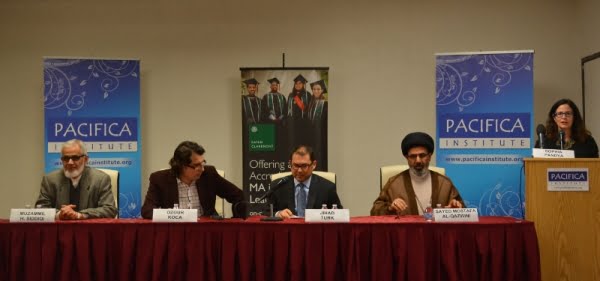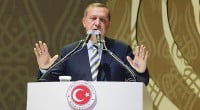California Muslim Leaders Raised Their Voices, Condemning Extremism

Date posted: January 17, 2015
Pacifica Institute hosted a panel on “Muslim Voices against Extremism” in cooperation with Bayan Graduate School and Congresswoman Loretta Sanchez.
Panel moderated by Dr. Sophia Pandya of CSU Long Beach featuring Professor Jihad Turk of Bayan Claremont Graduate School, Dr. Muzammil H. Siddiqi of Fiqh Council of North America, Dr. Ozgur Koca of Bayan Claremont Graduate School, and Imam Sayed Mostafa al-Qazwini of Shia Muslim Council of Southern California as the panelists.
Event draw media attention since it was held days after terror attacks on January 7, 2015 in Paris, provided religious leaders and scholars an opportunity to get their message across, as well as for people of many faiths to gather together to denounce the killings.
Message of Congresswoman Loretta Sanchez was presented by her community liaison, Rida Hamida together with a Certificate of Congressional Recognition at the beginning.
First panelist Dr. Muzammil Siddiqi in his message stated that Islam does not allow any individual or group to take the law in their own hands and kill any person or group on the ground of real or perceived grievances or even crimes. Islam affirms the sanctity of human life and requires due and fair process of law. What all need is to promote the spirit of mutual respect of all faiths, convictions and cultures. All stand to benefit from mutual decency and co-operation for the common good. He made a call on governments, media and civil society to distinguish between the hateful words and actions of a small fringe of any major world religion in contrast to the authentic teachings of such faith groups. Random, irrational and hateful words or acts of revenge, injustice or discrimination on the basis of broad religious identification should be equally condemned as they only aggravate what is already a serious challenge to peaceful co-existence, civility and the rule of law.
Next panelist was Dr. Ozgur Koca started off with a “No, not at all” as an answer to “Is Islam inherently violent or chronically unable to adapt to modern values?” He added that none of the religions are violent where they are centralizing around compassion with examples from different religions. Mercy, justice, equality and co-existence are in the core teachings of Islam where mercy is the stamp of creation. God’s mercy precedes over his wrath is what Islam is revolving around and cannot be violent. For centuries in the past, Muslims have successfully proven that aspect of Islam throughout their rule. Anti-Semitism or genocide was unknown terms when they were successfully promoting pluralism. Terrorist organizations with different backgrounds are using political and economic grievances within a religious rhetoric and it is being reflected as violent ideology. Religious illiteracy is playing an important role in these hideous acts both by committers and audiences. Being self-critical is essential for Muslims. All have to condemn these terrorist attacks without a “but” and without a “however”.
Third panelist Imam Sayed Mostafa al-Qazwini’s tenet was on “why we have extremism emerging from the most peaceful religion in the world? What contributed to create the scene we see now?” So called Islamic extremism is the product of dictatorship exercised for centuries in Muslim world. This is the first reason of extremism emerging in Islamic societies. The rulers claim that they are successors of the Prophet Muhammad and the public has to obey what they do or say. In fact Islam says “whoever wants to believe let him do so and whoever wants to reject let him do so”. We don’t coerce anyone to believe into my religion he added. In the absence of pluralism and democracy, in Muslim world, the public must submit to the will of a political leader instead of the will of God. Second reason for the emergence of extremism in Muslim countries is misguidance and ignorance. Most of the Muslims around the world are learning about Islam only during Friday services for 15-20 minutes. Sermons are given to imams by governments and most of the scholars in Muslim countries work for the government, not for the God. Muslims lack critical studies of their own religion, because they don’t have the freedom and facility. Scholars are not provided with dignity and human rights to speak their mind. That is also why there is a wave of immigration out of Islamic countries.
Last panelist Jihad Turk, build his message around Prophet Muhammad’s life. Prophet Muhammad was born as an orphan in Mecca where it was housing a sanctuary for the people originally to worship God, believed to be built by Prophet Abraham. Mecca was a safe place for all travelers among tribal Arab battles. On the other hand, there were some troubling traditions in the society such as slavery, treatment of women etc. Therefore, Prophet Muhammad’s first messages were towards transforming the society against all social injustices. He and his followers have experienced great opposition from the leadership. He repelled evil by goodness. His message of peace, reconciliation has resonated. When he has taken the power, his message was amnesty for everyone.
After the presentations of panelists, program was finalized by question and answer session.
We would like to thank our volunteers, audience, moderator, and panelists, as well as partners, office of Congresswoman Loretta Sanchez and Bayan Graduate School. We strive to deliver the messages our community needs the most and stay tuned for upcoming topics!
Source: Pacifica Institute , January 13, 2015
Tags: Dialogue | North America | USA |
























